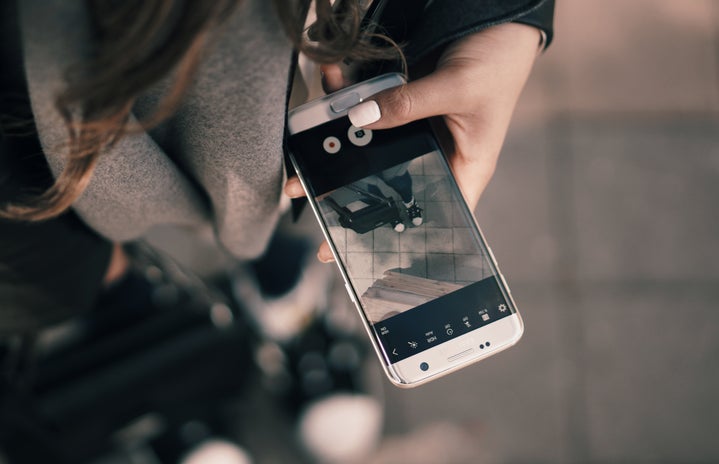There’s no doubt that social media is overwhelmingly beneficial when used correctly, it lets you stay up to date on news, stay in touch with friends and family, and watch more and more funny videos to help procrastinate your homework. But, it’s proven that social media can be detrimental towards individual self-esteem.
Social media has the undeniable power to both build confidence and emphasize insecurity. We look for Instagram for that instant confidence boost, and consequences can be devastating if we don’t receive the validation we expect. Today, it’s almost as if you’re required to have a certain number of likes in order to be accepted in modern day society. Social media has now become a way of living, a major part of everyday life; but you simply will not find happiness while searching for self-validation online.
Selena Gomez weighed in on all this in her Vogue interview, claiming once she became the most followed person on Instagram she “sort of freaked out. It had become consuming to me. It’s what I woke up to and went to sleep to. I was an addict, and it felt like I was seeing things I didn’t want to see. Like it was putting things in my head that I didn’t want to care about.” Gomez then took a well-deserved three-month purge from social media and the spotlight.
Last year, you may remember the social media revolution started by Essena O’Neill, the Instagram it-girl who caused quite the commotion upon announcing she was quitting social media due to the disastrous toll it was taking on her, as she would “measure her self-worth by the number of likes” she received on her Instagram photos. Essena projected the image of a perfect girl living the perfect life, a living, breathing epitome of the word “goals.” But Essena admitted not all was as it seemed, emphasizing what you see on social media isn’t “real life.”
Even Psychologists claim social media messes with your head, coining the problem as “contingent self-worth.” It’s often unconscious, and now increasingly common in millennials. A 2014 survey found that 68% of people post content on social media in order to “define their identities.” These kinds of social media centered attitudes encourage you to abandon what makes you unique and present yourself in such a way that is relatable, cool, and attractive to others. Making yourself likable has been a goal in real life forever, but has become so much more monumental on social media.
Social media is supposed to be a fun, positive thing – the second it becomes anything other than that, it’s time to take a step back and reevaluate. Social media should only be a portion of your life, not consume it. Limit and monitor the time you’re spending on each site, what’s going on in the Kardashian’s lives shouldn’t be your priority, what’s going on in your life should be. We need to learn, understand, and continue to teach young people your social media accounts aren’t the pinnacle of your life, and will never be your greatest accomplishment.
Don’t compare yourself to others, just don’t; I don’t care how many times you’ve heard this or how trivial it sounds. That girl smiling on the beach in that to-die-for bikini in Cabo isn’t perfect. You’re only seeing what they want you to see, social media was meant to highlight the best parts of everyday life- you never really see behind the scenes. Without such context, it makes no sense to compare your own self to an online being or photo, which was probably carefully selected out of a set of thirty almost identical images, retouched, and tried tested out with five different filters. Nothing is as effortless as it seems.
And yes, FOMO is definitely a thing and social media definitely makes it worse. All those pics of people having so much fun on the night you decided to stay in can make you feel a little down. But remember, you only see what other’s want and let you see on social media, what you see isn’t always what you get…you might be better off staying in bed and Netflix binging.
Be kind to yourself, you will soon believe everything you think about yourself, good or bad. This will affect your quality of life immensely. Take a step back and think about all the great things you’ve accomplished and how hard you’ve worked to become the person you are today. Always give yourself credit. Stand strong in what makes you, you. Don’t post pictures to prove anything to anyone, you should appreciate others and the love they show, but don’t become dependent on their “like.”
You are so much more than your social media portrays you as!



